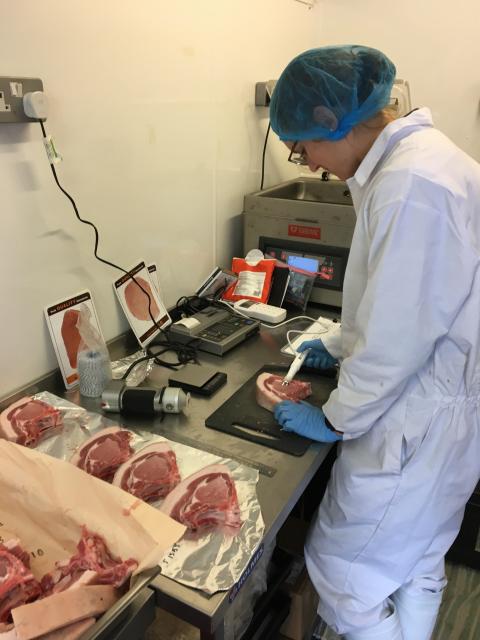Recent research trials have shown that pork reared on a forage rich pasture contained a significant increase in a-Linolenic acid (ALA), a type of omega 3 fatty acid found in seeds and oil to compare with pork reared on a barren paddock.
These findings were the result of a novel research project held by Menter Moch Cymru and Farming Connect at Forest Coalpit Farm. The intention of the project led by Farming Connect was to compare the meat quality of pigs from two groups, one group reared on a combination of forage and concentrates and the other on concentrates only.
Director of the food quality management consultancy firm FQM Global, Caroline Mitchell oversaw the project with further analysis of the pork being carried out by the Food Technology Centre in Llangefni.
The results of the project were discussed in a webinar recently by Caroline Mitchell from FQM Global:
“As pigs are unable to synthesise ALA, the increase of the n-3 or omega 3 essential fatty acid is a direct result of the addition of the forage to the diet.
“There are multiple benefits of eating products containing ALA for the human consumer, for example, heart attack prevention, lower high blood pressure, lower cholesterol and reverses hardening of the blood vessels.
Melanie Cargill, Menter Moch Cymru Project Manager said: “The project has been a great opportunity to look at the effects that different diets can have on the quality of pork and hopefully in the future the ground-breaking results could potentially add value to the product.
“This is the first project of its kind and it’s encouraging to see that significant differences in the pork were identified. More research will need to be conducted in this area, and so hopefully the results from this study will act as a catalyst for further research.”
The quality of their pork is very important to Kyle Holford and Lauren Smith of Forest Coalpit Farm who run their own 20 sow farrow to finish herd of their own breed of Welsh Black (Large Black X Duroc) pigs on pasture and woodlands on their farm in the Brecon Beacons.
They butcher and sell their produce directly to customers in pork boxes and also supply award winning restaurants and butchers.
Kyle Holford said: “I’m often sat eating some of our pork pondering why it tastes so great, obviously it’s a variety of factors; breed, free-range, management and diet. I wanted to do this project in order to find out what role forage had on flavour and quantify the benefits it brings.
“Our main focus was on analysing the fats as this is where the difference shows up on other species. As well as this we weighed the pigs throughout to see if forage brings any production benefits as well. From this project we hope to learn the value of forage in an outdoor pig operation whether it’s from a production benefit, taste or for carbon sequestration and environmental benefits,” he added.
The project looked at addressing the increase desire from consumers to see quality and traceability in their produce.
“It’s been fascinating to look at the relationship between feeding pigs forage and the effect it has on meat and fat quality. I’m still amazed that this is the first project of this kind. And to find out that it effects the fat and makes a healthier product is just phenomenal. This just shows there is even more benefit to raising pigs outside on grass and other producers can use this to quantify it and add value to an already great product. Thanks very much to Menter Moch Cymru and Farming Connect for the opportunity to do this,” added Kyle.
Dafydd Owen, Pig Technical Officer for Farming Connect said:
“With the current fragile situation in the pig industry, the results of the project are great for adding value by offering Forest Coalpit Farm produce a unique selling point. There are health and environmental benefits from pig finishing on grass in line with the growing desire for quality and traceability in products. "
Menter Moch Cymru is funded by the Welsh Government Rural Communities – Rural Development Programme 2014-2020, which is funded by the European Agricultural Fund for Rural Development and the Welsh Government.

